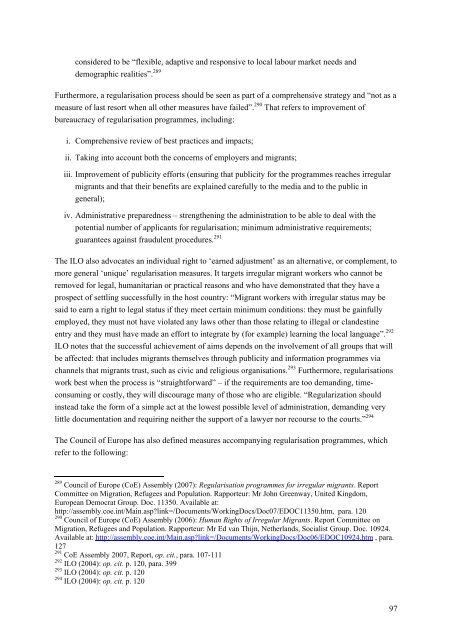REGINE Regularisations in Europe Final Report - European ...
REGINE Regularisations in Europe Final Report - European ...
REGINE Regularisations in Europe Final Report - European ...
Create successful ePaper yourself
Turn your PDF publications into a flip-book with our unique Google optimized e-Paper software.
considered to be “flexible, adaptive and responsive to local labour market needs and<br />
demographic realities”. 289<br />
Furthermore, a regularisation process should be seen as part of a comprehensive strategy and “not as a<br />
measure of last resort when all other measures have failed”. 290 That refers to improvement of<br />
bureaucracy of regularisation programmes, <strong>in</strong>clud<strong>in</strong>g:<br />
i. Comprehensive review of best practices and impacts;<br />
ii. Tak<strong>in</strong>g <strong>in</strong>to account both the concerns of employers and migrants;<br />
iii. Improvement of publicity efforts (ensur<strong>in</strong>g that publicity for the programmes reaches irregular<br />
migrants and that their benefits are expla<strong>in</strong>ed carefully to the media and to the public <strong>in</strong><br />
general);<br />
iv. Adm<strong>in</strong>istrative preparedness – strengthen<strong>in</strong>g the adm<strong>in</strong>istration to be able to deal with the<br />
potential number of applicants for regularisation; m<strong>in</strong>imum adm<strong>in</strong>istrative requirements;<br />
guarantees aga<strong>in</strong>st fraudulent procedures. 291<br />
The ILO also advocates an <strong>in</strong>dividual right to ‘earned adjustment’ as an alternative, or complement, to<br />
more general ‘unique’ regularisation measures. It targets irregular migrant workers who cannot be<br />
removed for legal, humanitarian or practical reasons and who have demonstrated that they have a<br />
prospect of settl<strong>in</strong>g successfully <strong>in</strong> the host country: “Migrant workers with irregular status may be<br />
said to earn a right to legal status if they meet certa<strong>in</strong> m<strong>in</strong>imum conditions: they must be ga<strong>in</strong>fully<br />
employed, they must not have violated any laws other than those relat<strong>in</strong>g to illegal or clandest<strong>in</strong>e<br />
entry and they must have made an effort to <strong>in</strong>tegrate by (for example) learn<strong>in</strong>g the local language”. 292<br />
ILO notes that the successful achievement of aims depends on the <strong>in</strong>volvement of all groups that will<br />
be affected: that <strong>in</strong>cludes migrants themselves through publicity and <strong>in</strong>formation programmes via<br />
channels that migrants trust, such as civic and religious organisations. 293 Furthermore, regularisations<br />
work best when the process is “straightforward” – if the requirements are too demand<strong>in</strong>g, timeconsum<strong>in</strong>g<br />
or costly, they will discourage many of those who are eligible. “Regularization should<br />
<strong>in</strong>stead take the form of a simple act at the lowest possible level of adm<strong>in</strong>istration, demand<strong>in</strong>g very<br />
little documentation and requir<strong>in</strong>g neither the support of a lawyer nor recourse to the courts.” 294<br />
The Council of <strong>Europe</strong> has also def<strong>in</strong>ed measures accompany<strong>in</strong>g regularisation programmes, which<br />
refer to the follow<strong>in</strong>g:<br />
289 Council of <strong>Europe</strong> (CoE) Assembly (2007): Regularisation programmes for irregular migrants. <strong>Report</strong><br />
Committee on Migration, Refugees and Population. Rapporteur: Mr John Greenway, United K<strong>in</strong>gdom,<br />
<strong>Europe</strong>an Democrat Group. Doc. 11350. Available at:<br />
http://assembly.coe.<strong>in</strong>t/Ma<strong>in</strong>.asp?l<strong>in</strong>k=/Documents/Work<strong>in</strong>gDocs/Doc07/EDOC11350.htm, para. 120<br />
290 Council of <strong>Europe</strong> (CoE) Assembly (2006): Human Rights of Irregular Migrants. <strong>Report</strong> Committee on<br />
Migration, Refugees and Population. Rapporteur: Mr Ed van Thijn, Netherlands, Socialist Group. Doc. 10924.<br />
Available at: http://assembly.coe.<strong>in</strong>t/Ma<strong>in</strong>.asp?l<strong>in</strong>k=/Documents/Work<strong>in</strong>gDocs/Doc06/EDOC10924.htm , para.<br />
127<br />
291 CoE Assembly 2007, <strong>Report</strong>, op. cit., para. 107-111<br />
292 ILO (2004): op. cit. p. 120, para. 399<br />
293 ILO (2004): op. cit. p. 120<br />
294 ILO (2004): op. cit. p. 120<br />
97
















